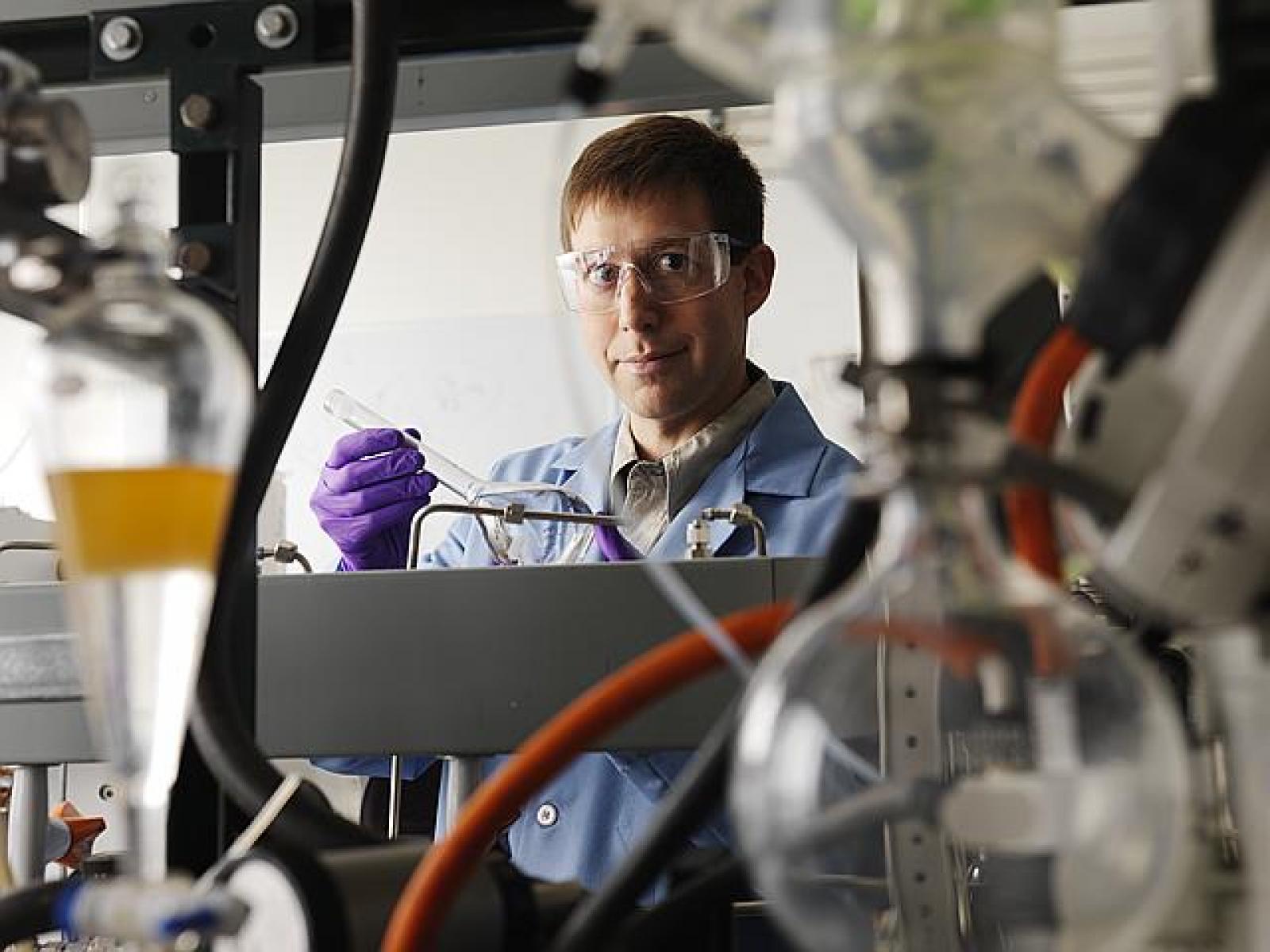Making Air Travel Cleaner and Safer and Giving Thanks at PNNL

Bio-based products and catalysis research, including scientific collaborations with Washington State University at the Bioproducts, Sciences, and Engineering Laboratory on the WSU Tri-Cities campus, are helping deliver technologies that reduce reliance on foreign oil and gas to private industry and government customers.
(Photo by Pacific Northwest National Laboratory)
No sooner than we turn back the clocks, the weather takes a turn and reminds us that the holidays are just around the corner. For many of us, this means flying to see family and friends—or picking them up at the newly remodeled Tri-Cities Airport.
Most of us take flying for granted, trusting that someone somewhere is working to ensure that it is safe and sustainable. Well, as you might guess, the scientists and engineers at the Department of Energy's Pacific Northwest National Laboratory are among those engaged in this endeavor.
At PNNL, we apply our science and technology to a number of aviation challenges. For example, we are working to make it more environmentally friendly through our work on bio-based aviation fuels and de-icers.
PNNL is teaming with Washington State University to make jet fuels that will reduce the airlines' carbon footprint as part of a Federal Aviation Administration center of excellence. This research leverages our longstanding partnership in the Bio-products Science and Engineering Laboratory at WSU Tri-Cities.
In another project from a few years ago, we developed a technology to produce propylene glycol from bio-based material instead of petroleum. Propylene glycol is a common ingredient in many household and commercial products, including de-icing fluids. We licensed the technology to Archer Daniels Midland and they now produce upwards of 100 million pounds of renewable propylene glycol per year.
PNNL scientists and engineers also are working to improve airline security, passenger screening in particular. The millimeter wave full-body scanners developed by PNNL are used at airports around the world and throughout the United States—even at Tri-Cities Airport—to quickly screen passengers for concealed weapons or plastic explosives that conventional metal detectors would miss.
Meanwhile, back in the lab, we are working on a new bottle screening technology that will detect liquid explosives. It builds on PNNL's portable acoustic inspection technology that can determine the contents of a sealed container without opening it. This technology is quick, noninvasive and so sensitive it can differentiate between Coke and Diet Coke.
Thanksgiving also is a time to reflect on our good fortune—and there are many things at PNNL for which we are grateful.
First, we have incredibly talented employees and supportive families. Our 4,300 scientists, engineers and support professionals do amazing things every day. They are highly dedicated, often working long hours and spending days away from their families as they travel to conduct their research, present their findings or meet with sponsors and collaborators. Their families put up with a lot, and I thank them for their understanding and support.
Second, we have wonderful partners, locally and nationally. I already mentioned one of our many collaborations with WSU. We also partner extensively with the University of Washington. For example, we created the Northwest Institute for Advanced Computing on the UW campus to foster joint research in computing and its applications. We worked in partnership with Columbia Basin College to develop and launch CBC's cyber security program, which is preparing the future work force in this critical and growing field.
Beyond the Northwest, I recently visited the Joint Global Change Research Institute in Maryland, where we work with University of Maryland colleagues to advance our understanding of the impacts of climate change. And last month, PNNL signed an agreement with Arizona State University to collaborate on research related to energy security, climate science and sustainability and other aspects of global security.
We also partner broadly with industry to translate our discoveries into new products. In addition to the Archer Daniels Midland example above, we have teamed with start-ups in Mukilteo and Massachusetts to commercialize our battery technologies. We welcome industry collaborations and use of our state-of-the-art scientific instruments. For example, Monsanto joined with PNNL and three universities to use some of our instruments to enhance biofuel production and sustainable agriculture.
Third, I wish to thank our many sponsors for placing their trust in us. Most of our research is funded by DOE and the National Nuclear Security Administration, but we also appreciate the support and confidence of the Departments of Defense and Homeland Security, and the National Institutes of Health, to name just a few. Of course, these agencies and PNNL are ultimately dependent upon the American taxpayers who fund our research. We are committed to stewarding these funds responsibly.
Last, but certainly not least, at PNNL we are grateful for the Tri-Cities community and the support you provide. We enjoy being part of such a vibrant community and value all the ways that we work together to improve our quality of life. We do our best to give back in various ways, including Battelle's charitable giving and the volunteer work of so many of our employees. We are proud to call the Tri-Cities home and thankful for our neighbors.
Steven Ashby, director of Pacific Northwest National Laboratory, writes this column monthly. To read previous Director's Columns, visit pnnl.gov/news and filter by Director's Columns in our Latest Stories.
Published: November 18, 2015